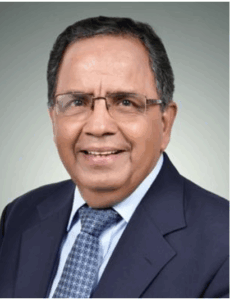 This is the first in the series of short statements from candidates in the coming CODATA Elections at the General Assembly to be held on 17-18 October 2025. Narinder Kumar Mehra is a candidate for the CODATA Executive Committee as an Ordinary Member. He was nominated by the Indian National Science Academy.
This is the first in the series of short statements from candidates in the coming CODATA Elections at the General Assembly to be held on 17-18 October 2025. Narinder Kumar Mehra is a candidate for the CODATA Executive Committee as an Ordinary Member. He was nominated by the Indian National Science Academy.
I am a Clinical Immunologist with special focus on Transplant Immunology for achieving successful graft outcome following solid organ and hematopoietic stem cell transplantation. A critical requirement here is the selection of HLA gene matched donor-recipient pairs, for which it is imperative to develop extensive international collaboration and exchange population based data. This has kept me engaged with the Science of Data for over four decades, because without data sharing, it is not possible to save lives. My other area of clinical interest has been the discovery of immune response based biomarkers for autoimmune and infectious diseases, an area again requiring data driven decision making.
My scientific career started in the early 1970s in HLA genetics when this subject was virtually non-existent and its impact in Medicine and Biology was beginning to be understood worldwide. With initial training in European centres, I was able to successfully establish Transplant Immunology and clinical immunogenetics as an independent specialty for the first time in India at the All-India Institute of Medical Sciences, New Delhi. This was an arduous task and I often had to work under extreme difficult conditions with very little funding and mentoring support.
Extensive international exposure has helped me develop deep understanding of the global trends in science and technology. I served as councilor for the International Union of Immunological Societies for four terms and as co-chair of their committee on Gender equality and career development and spent two years at the world-famous Fred Hutchinson Cancer Research centre (Seattle, USA). I am a Fellow of all Science and Medical Academies in India, have over 100 scientific awards and academic honors including the most coveted S.S. Bhatnagar prize of the CSIR (India). The French Government conferred on me the Chevalier of the National Order of Merit and the Iranian Research Organization on Science and Technology selected me for their prestigious Khwarizmi International Award 2004’.
I am a recipient of prominent international recognitions namely, Member Honoris Causa of the Hungarian Academy of Sciences, Fellow of the Academy of Sciences of South Africa (F-ASSAf), Fellow of The World Academy of Sciences (FTWAS), Honorary Fellow of the Royal College of Physicians (FRCP) of UK, Fellow of the International Science Council (FISC) and Fellow of the International CORE Academy of Sciences and Humanities (FCAcad). These helped me nurture skill in promoting collaborative networks and develop research programs of public importance.
I have represented India in the BRICS Science Forums (2022 theme: Big Data sharing), meetings of the ISC and of Inter-academy partnership (IAP). During the G20 Presidency of India (2023), I coordinated the Science 20 activities with focus on clean energy for sustenance, universal holistic health and Science for Society or Citizen Science. Currently, I am ‘Treasurer’ of the Association of Academies and Societies of Science in Asia (AASSA), which is the Asian component of IAP.
Since assuming charge as chair of the National committee on Co-data in India, my responsibilities and involvement in Data Science have considerably increased. This is because the potential of new data technologies like artificial intelligence, machine learning, remote sensing and geospatial analysis to improve critical humanitarian and development work is immense. We organized several activities.
In 2014, we organized the General Assembly of CODATA in New Delhi, followed by the Data Science protocols in 2015. We also organized ‘monthly talks on Data Science to create awareness.
In Sep 2024, we organized a regional workshop in New Delhi, supported by IAP and AASSA to discuss Science Policy Futures of Asia
In June 2025, we organized the India ‘Research AI Summit: bridging innovation and Open Science bringing together national data custodians, funders and global AI experts including Francis Crawley. During this meeting, the Indian Research Assessment Forum (IRAF) was formally launched.
In August 2025, we organized the National Conclave on Climate Education and Data Custodianship. Besides lectures by Indian experts, lead lecture was delivered by Mathew Pye, Founder Climate Academy, Belgium. A large number of School students of class 9 to 12 attended the interactive event.
It is important for our Gen Next to be data-literate, and rely on data-driven decision making. India has allocated huge resources to produce an indigenous Large Language Model (LLM) and domain-specific foundational models in critical sectors. This is the opportune time for South Asia to have a strong representation in CODATA and align global synergies in data science with regional expectations. My involvement in various scientific and academic committees, extensive network of international collaborations, and commitment to fostering scientific excellence could greatly benefit the CODATA Executive Committee to enhance its impact to connect data and scientific community, and address global challenges.
